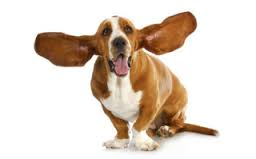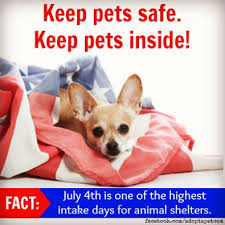Archive for July 1st, 2016
Scent Hounds
 This type of dog hunts by scent rather than sound or a dog toy. They have one of the most sensitive noses of all canines. These dogs specialize in following a smell or scent. Scent hounds have long drooping ears. One theory is that the ears help to collect scent and keep it near the nose and face. They also have very large nasal cavities which are better to detect a scent. Scent hounds are not fast but they don’t need to be because they don’t need to keep their prey in sight. They need to have lots of endurance because they have to follow a scent a long distance and through rough terrain. They can follow a scent trail even across water and even if the scent is several days old. Scent hounds usually hunt in packs sometimes with multiple dogs in a single pack. Most of these breeds have booming voices and will use them while they are tracking a scent. This trait allows a dog’s handler to follow the dog or pack of dogs during a hunt even if they are out of sight.
This type of dog hunts by scent rather than sound or a dog toy. They have one of the most sensitive noses of all canines. These dogs specialize in following a smell or scent. Scent hounds have long drooping ears. One theory is that the ears help to collect scent and keep it near the nose and face. They also have very large nasal cavities which are better to detect a scent. Scent hounds are not fast but they don’t need to be because they don’t need to keep their prey in sight. They need to have lots of endurance because they have to follow a scent a long distance and through rough terrain. They can follow a scent trail even across water and even if the scent is several days old. Scent hounds usually hunt in packs sometimes with multiple dogs in a single pack. Most of these breeds have booming voices and will use them while they are tracking a scent. This trait allows a dog’s handler to follow the dog or pack of dogs during a hunt even if they are out of sight.
Rather then chasing dog toys, these dogs are more comfortable chasing a scent. They are frequently used by the police to track criminals.
Remember, your pets count!
Shop for all of your pets products at The Pet Product Guru Store.
All oldies, all holiday weekend. Set it and forget it Edgewater Gold Radio.
10 Fourth of July Pet Safety Tips
 This holiday weekend make sure that you take you pets safety into consideration. Parties, cookouts, traffic, hot weather and fireworks can affect your pet. Pet MD has put together ways to keep you pet safe.
This holiday weekend make sure that you take you pets safety into consideration. Parties, cookouts, traffic, hot weather and fireworks can affect your pet. Pet MD has put together ways to keep you pet safe.
10. Keep your Pet Indoors at All Times!
It may seem obvious, but even if your pet is used to being outside, the resulting panic caused by fireworks or other loud noises may make them break their restraint or jump a fence or dog gate in a terrified attempt to find safety.
9. Don’t Put Insect Repellant on Your Pet that isn’t Specifically for Pet Use
The same tip applies to applying “people” sunscreen on your pet. What isn’t toxic to humans can be toxic to animals. The ASPCA lists the poisonous effects of sunscreen on your pet as, “…drooling, vomiting, diarrhea, excessive thirst and lethargy.” DEET, a common insecticide, may cause neurological issues.
8. Alcoholic Drinks Poison Pets
If your pet drinks alcohol, they can become dangerously intoxicated, go into a coma, or in severe cases, die from respiratory failure. Yes, even beer is toxic; fermented hops and ethanol are poisonous to dogs and cats. Stick with a filled water bowl.
7. Going to a Fireworks Display? Leave Your Pet at Home
The safest place for your pet is at home, not in a crowded, unfamiliar and noisy place. The combination of too many people and loud fireworks will make your beloved pet freak out and desperately seek shelter. Locking them in the car is also not an option; your pet may suffer brain damage and heat stroke.
6. Have Your Pet Properly Identified
If your pet manages to break loose from his dog leash and become lost, without proper identification it will be that much harder to get them back. Consider fitting your pet with microchip identification, ID tags with their name and your phone number, or both. It is also a good idea to have a recent picture of your pets in case you have to put up signs.
5. Keep Your Pet Away from Glow Jewelry
It might look cute, but your pet could chew up and swallow the plastic adornments. The ASPCA states that while not highly toxic, “excessive drooling and gastrointestinal irritation could still result from ingestions, and intestinal blockage could occur from swallowing large pieces of the plastic containers.”
4. NEVER Use Fireworks Around Pets
While lit fireworks can pose a danger to curious pets and potentially result in severe burns and/or trauma to the face and paws, even unused fireworks can be hazardous. Some fireworks contain potentially toxic substances such as arsenic, potassium nitrate, and other heavy metals.
3. Don’t Give Your Pet “Table Food”
If you are having a backyard barbeque, you may be tempted to slip some snacks to your pet. But like beer and chocolate, there are other festive foods that could harm your pet. Onions, coffee, avocado, grapes & raisins, salt and yeast dough are all possible hazards for dogs and cats. Safely provide dog treats and cat treats for your pet to munch on instead.
2. Lighter Fluid and Matches Are Harmful to Pets.
The ASPCA lists chlorates as a harmful chemical substance found in some matches that, if ingested, can cause your pet difficulty in breathing, damage blood cells or even cause kidney disease. If exposed to lighter fluid, your pet may sustain skin irritation on contact, respiratory problems if inhaled, and gastric problems if ingested.
- Citronella Insect Control Products Harm Pets, Too.Oils, candles, insect coils and other citronella-based repellants are irritating toxins to pets, according to the ASPCA. The result of inhalation can cause severe respiratory illnesses such as pneumonia, and ingestion can harm your pet’s nervous system.
The safest and best bet for celebrating this Fourth of July with your pets is to exclude them from holiday festivities, at least this time around. Instead, find a safe, secure spot in the home for your pets while you go out and enjoy the loud bangs, bright lights and spectator fun. Your pets will appreciate the quiet a lot more than you’ll enjoy the noise.
Thanks to Pet MD for providing these helpful tips!
Remember your pets count!
Shop a wide selection of pet products in The Pet Product Guru Store!
Oldies and Fourth of July festivities go hand in hand. Take your oldies along and keep Edgewater Gold Radio on all weekend long! Download the FREE Edgewwater Gold Radio App today and you’re all set!